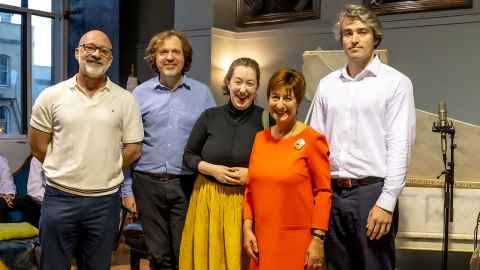Rare and precious keys to a musical career
18 April 2024
A salon-style recital where music students compete for the generous Anna Nathan Prize in Early Keyboard Music is an annual highlight for students and staff at the University of Auckland.

“Our students have the whole history of keyboard music at their fingertips,” says Stephen De Pledge, Head of Piano at the University’s School of Music.
He looks with pleasure across the room at a large array of beautiful early instruments –harpsichords, clavichords, fortepianos – forming just a part of the University’s rare and precious early keyboard instrument collection, dating from the 1600s all the way to the present day. The most recent addition is a virtual organ donated by the late Graeme Edwards, a valued supporter of the early music programme.
Stephen plays a few notes on the nearest fortepiano and listens intently to the sound.
“Our students have many choices,” he says. “They can play Bach on a harpsichord, Mozart on a Viennese piano, Chopin on a fortepiano from the mid-19th century. And as they play they hear the sounds the early composers heard.
“This greatly extends their technical skills and opens new doors for performance; but it also enhances their piano playing. Knowing what Bach was hearing while he was composing helps inform their own choices for interpretation 300 years later.”
An annual highlight for students and staff – and a treat for Auckland music lovers – is the salon-style recital at which students compete for the generous Anna Nathan Prize in Early Keyboard Music.
“We’re lucky to have the support of a person like Anna Nathan,” says Stephen. “She understands the importance of the programme, appreciates how talented our students are, and sees how it enhances their career opportunities at a time when early music is in the midst of a revival.
“She has also gifted a beautiful clavichord to the University’s collection.”
He said she was thrilled with the standard in the last recital, which featured five finalists playing the harpsichord. “This was a truly lovely occasion. These instruments are not very often heard in concert. A lot of people in that room had never heard a harpsichord live before. I heard people saying they’d had no idea the sound would be so beautiful or the atmosphere so intimate.”

The harpsichord, like the fortepiano, is a domestic instrument made to be played in an intimate space. The venue, Viela in Karangahape Road, kindly loaned by School of Music alumnus Jack Bourke, was “very stylish, not huge but beautiful, like someone’s elegant drawing room”.
To the top prize-winner, Xavier Manetto-Munro, “it felt a little like a large dinner party, held in an aristocratic home, with pauses for harpsichord pieces and then a return to festivities. The recital was conducted in a way that helped bring the history of the harpsichord alive”.
They can play Bach on a harpsichord, Mozart on a Viennese piano, Chopin on a fortepiano from the mid-19th century. And as they play they hear the sounds the early composers heard.
For the students, said Stephen, the recital was like “a spreading of the wings”, a chance to be with and perform for others after many months of practice alone in a room.
“On stage the performers open up and that’s a thrill to see. You can feel the connection when the people in the audience focus and respond – and that rapport is a vital part of a young musician’s training.”
Said Xavier, who is now specialising in early music for his masters degree, “it was an exciting way to cap off the course, to build towards a performance that is not just for examiners but for a very attentive audience of people who love the music”.
Media contact
Helen Borne | Communications and Marketing Manager
Alumni Relations and Development
Email: h.borne@auckland.ac.nz